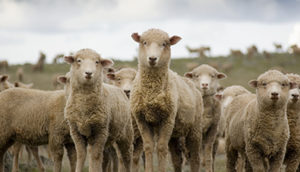Read the latest information on
Foot-and-mouth disease
 Producers in Tasmania will once again have access to an animal health monitoring and biosecurity network, funded by Animal Health Australia (AHA) and the Department of Primary Industries, Parks, Water and Environment.
Producers in Tasmania will once again have access to an animal health monitoring and biosecurity network, funded by Animal Health Australia (AHA) and the Department of Primary Industries, Parks, Water and Environment.
The network, coordinated by veterinarian Dr Bruce Jackson, aims to bring together service providers – such as private veterinarians, stock agents, rural merchandisers and shearing contractors – to conduct livestock health monitoring during their time spent on-farm, especially those with sheep.
As both eyes and ears on the ground, and trusted partners to producers, service providers can help bridge the gap between what producers are doing on-farm and the wider animal health and biosecurity systems.
Dr Rob Barwell, Senior Manager Biosecurity at AHA, said the benefits of such a network had been proven during a pilot phase in 2018 and 2019, and he was excited to see it revamped as a project with stronger biosecurity with a focus on the sheep and wool industries.
“This project really recognises the important role that livestock service providers play in sheep production,” Dr Barwell explained.
“Their knowledge of conditions on the ground and their trusted relationships with producers make them an essential part of our animal health surveillance and biosecurity systems.”
Participants recruited from among service providers will be responsible for reporting de-identified information about diseases and other health conditions which they encounter in the course of their regular work. This de-identified information will be collated by Dr Jackson and fed back to AHA, DPIPWE and their industry partners, to enable more targeted and relevant biosecurity information and support to be provided to producers through the network.
“Endemic diseases and health conditions cost the sheep industry millions of dollars a year in control efforts, lost production, and carcase wastage,” Dr Barwell explained.
“If we can gather information about where these conditions are causing the biggest problems, we can better support producers in tackling the issue on their own farms.”
“More eyes and ears conducting livestock health monitoring also means that any suspected emergency disease outbreaks can be caught and responded to much faster.”
Dr Jackson explained that the monthly summary reports were considered useful by producers, service providers and industry bodies in the pilot project. “Service providers also obtained timely veterinary advice, which helped them assist their clients with individual animal health issues.”
AHA is funding the Surveillance and Biosecurity Extension in Tasmania project with the support of sheep industry members Sheep Producers Australia and WoolProducers Australia, via their joint National Sheep Industry Biosecurity Strategy 2019-2024.
Find out more about biosecurity for sheep on the Farm Biosecurity website.